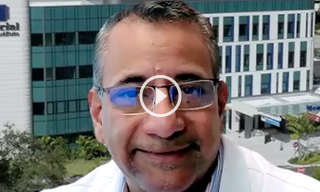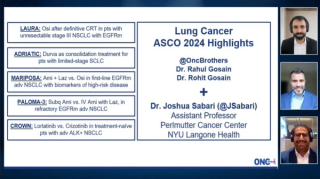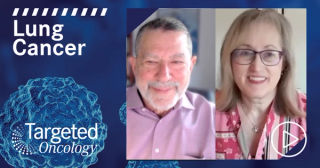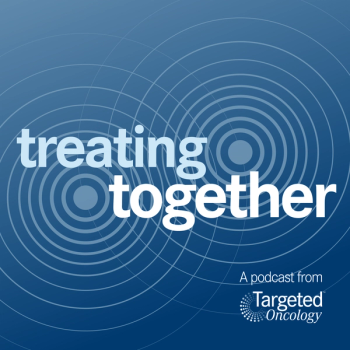
LUNG CANCER
Latest News
Video Series

Latest Videos
Podcasts
CME Content
More News


A groundbreaking biologics license application for ivonescimab targets advanced lung cancer, promising improved outcomes for patients with EGFR mutations.

The FDA designates zoldonrasib as a breakthrough therapy for KRAS G12D-mutated lung cancer, highlighting its promising efficacy and safety profile.

A new trial explores the effectiveness of calderasib combined with pembrolizumab for advanced lung cancer patients with the KRAS G12C mutation.

Sevabertinib receives breakthrough therapy designation for treating advanced HER2-mutant non-small cell lung cancer, promising new hope for patients.

2025 marks a transformative year in thoracic oncology, showcasing groundbreaking FDA approvals for targeted therapies in lung cancer treatment.

A new study reveals that common chronic medications do not impact the effectiveness of immune checkpoint inhibitors in metastatic lung cancer treatment.

The FDA approves a new subcutaneous formulation of amivantamab, enhancing treatment for advanced lung cancer with reduced administration time and improved safety.

Silevertinib shows promising antitumor activity in NSCLC and plans for a phase 2 trial in glioblastoma, targeting unmet oncology needs.

The OptiTROP-Lung05 trial shows promising results for sacituzumab tirumotecan combined with pembrolizumab in treating advanced non–small cell lung cancer.

A new subcutaneous formulation of toripalimab shows comparable efficacy to the intravenous version, enhancing convenience for lung cancer patients.

The PACIFIC-2 trial reveals that durvalumab with chemoradiotherapy offers no survival benefits for stage 3 NSCLC and increases treatment-related risks.

A recent study reveals cognitive behavioral therapy significantly enhances lung cancer patients' ability to manage dyspnea and anxiety, improving overall quality of life.

Zipalertinib shows promise as a treatment for advanced NSCLC with EGFR mutations, demonstrating significant response rates in recent trials.

The FDA reviews zidesamtinib for advanced ROS1+ NSCLC, promising new treatment options for patients resistant to current therapies.

Neladalkib shows promising efficacy in advanced ALK+ NSCLC, offering durable responses and manageable safety, potentially transforming treatment options.

The FDA has approved sevabertinib for HER2-mutant nonsquamous non–small cell lung cancer.

Biomarker testing in non–small cell lung cancer evolves with new protein-based markers and AI, enhancing personalized treatment strategies for patients.

A groundbreaking clinical trial begins for 225Ac-SSO110, targeting aggressive cancers like extensive-stage small cell lung cancer and Merkel cell carcinoma.

The FDA fast-tracks AVZO-1418, a promising treatment for EGFR-mutated lung cancer, enhancing development and approval processes for patients in need.

New trial data reveals STK-012 combined with pembrolizumab and chemotherapy shows promising efficacy in treating PD-L1 negative non-small cell lung cancer.

New data reveals lifileucel shows promising efficacy and safety in treating advanced non-small cell lung cancer, paving the way for potential FDA approval.

Sevabertinib demonstrates promising safety and efficacy in treating non–small cell lung cancer with HER2 or EGFR mutations, offering hope for patients.

A novel treatment combining EIK1001 with pembrolizumab shows promising response rates in advanced non-small cell lung cancer, enhancing patient outcomes.

Zenocutuzumab gains FDA breakthrough therapy designation for advanced cholangiocarcinoma, showcasing promising trial results and potential targeted treatment options.






























